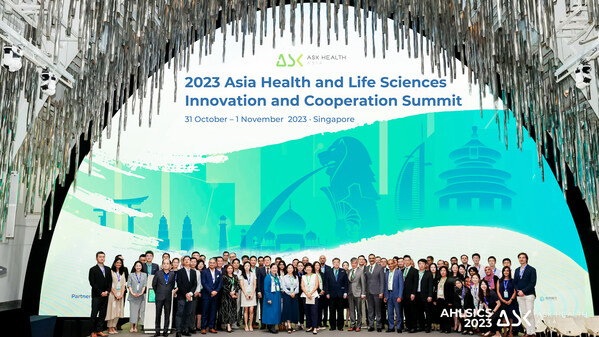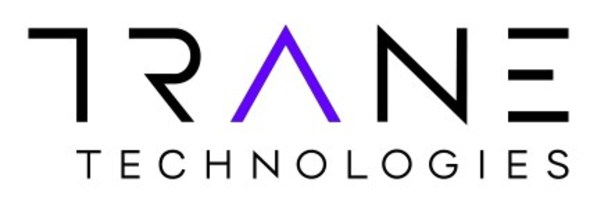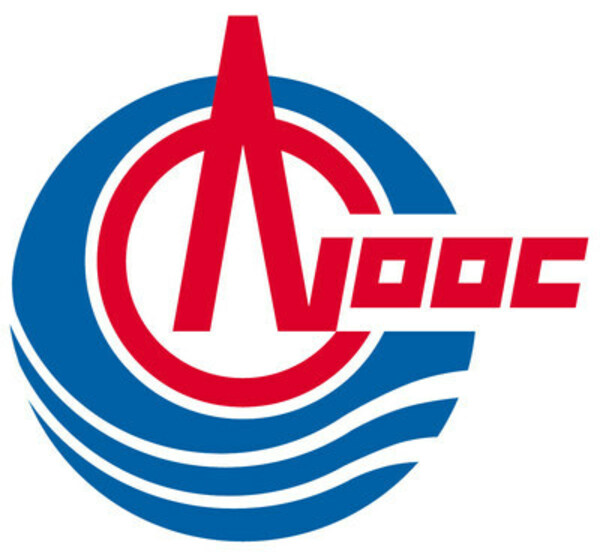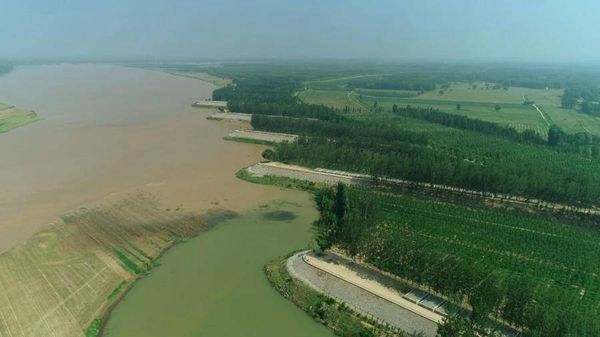SINGAPORE, Nov. 8, 2023 /PRNewswire/ -- The 2023 Asia Health and Life Sciences Innovation and Cooperation Summit (AHLSICS), hosted by ASK Health Asia and the SingHealth Duke-NUS Global Health Institute, in collaboration with the World Economic Forum, successfully concluded in Singapore on 1st November 2023. The two-day summit covered the landscape of Asia's life sciences innovation and strategic market opportunities through eight different topics that brought together health system leaders, multi-lateral organization representatives, policy experts, academic leaders, and ecosystem partners from nearly twenty countries and regions in Asia.
The summit was hosted by Dr. Chang Liu, founder of ASK Health Asia, Ms. Carrie Liu from the World Economic Forum, Mr. Antonio Estrella, managing director of Taliossa, and Ms. Anupama Puranik, managing director at Russel Reynolds Associates. In the opening, Associate Professor Tan Hiang Khoon, the Director of the SingHealth Duke-NUS Global Health Institute (SDGHI), and the Group Director of the International Collaboration Office (ICO) of SingHealth, highlighted the critical role innovations in health play in advancing global health and health equity. The deputy group chief executive officer of SingHealth, Professor Lee Chien Earn, extended a warm welcome to the summit guests from all parts of Asia, and noted that "SingHealth's vision is to define tomorrow's medicine, and part of this mission is to innovate and to advance". He highlighted the importance of creating the innovation ecosystem, which covers innovations at the micro level for the patient, at the institution or department level, as well as at the health system level.
The first morning of the summit covered two important topics: "Asia Market Opportunities for Life Science Innovation" partnered with AstraZeneca and Access Health International, and "Asia Life Science Innovation Landscape" partnered with the World Economic Forum and GenScript.
Dr. Krishna Reddy Nallamalla, President of ACCESS Health International Asia, and Dr. Jeremy Lim, director of the Global Health Programs, Saw Swee Hock School of Public Health, NUS moderated panels that delivered a deep dive into the vital discussion of cross-regional health commitment in this post-pandemic era. "All health systems need to be people-centered." Diah Satyani Saminarsih, Founder and Chief Executive Officer of the Center for Indonesia's Strategic Development Initiatives (CISDI), noted that civil society plays a critical role in healthcare delivery where services may be lacking. A granular understanding of marginalized populations was needed to identify gaps and design innovations that would benefit them. AstraZeneca Asia Vice-President Sylvia Varela highlighted AI's important role in improving healthcare delivery, including early detection and prevention of non-communicable diseases such as COPD and lung cancer. Speakers from LKY School of Public Policy, Praava Health, Consortium for Clinical Research and Innovation of Singapore (CRIS), GE Healthcare, and Apollo Hospitals, shared their perspectives on cross-regional cooperation of health systems and how we can meet patient needs through clinical and life-science innovations. CEO of AVPN Naina Subberwal Batra highlighted the collaborations between clinicians, civil society, academia, industry, governments, the private sector, and philanthropy are very much needed to fill the estimated US$371 billion annual gap in financing to achieve the Sustainable Development Goal three. Speakers from HKEX, China Pharmaceutical Innovation and Research Development Association (PhIRDA), ABC Impact, and the School of Public Health at Seoul National University discussed how various partners across Asia work together in cultivating a supportive environment for life science industry development. In the morning, leaders from Takeda, Harbour BioMed, United Imaging, and Grenscript showcased cutting-edge Asian life sciences innovation.
The first afternoon of the Summit covered two critical policy topics for access to life sciences innovations across Asia: "Regulatory Collaboration" and "Health Financing". Duke-NUS Medical School's Center for Regulatory Excellence (CoRE) and ISPOR Singapore Chapter are partners in the afternoon session. Prof John Lim, Executive Director at CORE moderated an informative panel discussion on enhancing health products regulatory cooperation across Asia with Paul Huleatt (Therapeutic Goods Administration, TGA), Marie Tham (Health Sciences Authority, HSA), Mayerni Situmorang (Badan Pengawas Obat dan Makanan, BPOM), as well as representatives from Luye Pharma Group and Hillgene Biopharma. The discussion presciently highlighted the importance of transnational regulatory cooperation and capacity building, while WHO just recently announced that Singapore's HSA, Korea's (Ministry of Food and Drug Safety, MFDS), and Switzerland's SwissMedic were the first three national regulatory authorities to achieve WHO-Listed Authority status. Mr. Anand Jha from ANSEA and Mr. Jeff Weisel, managing director of Avalere Health, brought together valuable observations and perspectives from diversified panelists from Asia Development Bank, National Healthcare Group Singapore, Research for Impact, Seoul National University, Harvard Medical School to explore options and new models for furthering Universal Healthcare Coverage and patient access across Asia; and discussed the innovations in health financing, especially the multi-layered models with panelists from Fudan University, Convergence Blended Finance, CXA, and ACCESS Health Southeast Asia.
The second day of the Summit addressed significant life science industry development building blocks and key issues with a wide range of experts and partner organizations. After the opening remarks from Dr. Cheong Wei Yang, vice provost of Singapore Management University and senior adviser of Singapore Ministry of Health, and Dr. Shyam Bishen, head of Centre for Health & Healthcare at the World Economic Forum, Dr. Weidong Hao, chief scientific officer of the Experimental Drug Development Centre (EDDC), delivered a keynote speech on Singapore's life science research capability and technology transfer growth. Speakers from Duke-NUS Medical School, PATH, ATLATL Scientific, the Life Sciences Institute at the National University of Singapore, and EY-Parthenon introduced the innovation capability across China, India, Singapore, and the rest of Asia as well as the opportunities for cross-regional collaboration. Microsoft and Ubang partnered on the second innovation showcase session of the summit, where leaders from Cerecin, Lerna Biopharma, and Chi Longevity presented their current development and strategic plans. The summit then continued with the panel discussion on the topic of Clinical Research and Manufacturing. Fabio La Mola, partner of Bain & Company, led the discussion on enhancing regional collaboration on life sciences clinical development and product manufacturing across the region with the representative of the Bill & Melinda Gates Foundation and leaders from Asia's R&D and supply chain sectors including Asia Cold Chain Association, Tigermed; Diagnostics Development Hub (DxD Hub), LabCorp Central Laboratories.
The afternoon session began with the topic of "Commercialization Cooperation Across Different Markets", in partnership with China International Capital Corporation (CICC). Leaders from CICC, International Finance Corporation (IFC), 3SBio, AffaMed Therapeutics, National Health Innovation Centre Singapore (NHIC), and VentureBlick discussed how industries are working together with healthcare partners to accelerate innovation. They also highlighted the opportunities and challenges for regional commercial partnerships among life sciences industry leaders in the region. Mrs. Michelle Gon, Han Kun Law Office, conveyed an interesting dialogue with Sino-Innovax Biotec, PT Etana Biotechnologies Indonesia, Parkway Laboratories, IHH Healthcare, Medtech Innovator, and LianBio, on detailed, diversified collaboration strategy for successful commercialization in Asia. The two panels gathered insights from panelists with various backgrounds: government bodies, international organizations, biotech companies, and medical institutions. The speakers highlighted that with a growing and aging population, the collaboration between startups, corporations, academia, and providers is creating an ecosystem of open innovation, paving the way for healthcare's future.
The last session of the summit, the Life Science Investor Forum, was in partnership with Singapore Exchange Group (SGX) and Haitong International Securities Group. With Dr. Chang Liu, founder and CEO of ASK Health Asia, and Mrs. Luming Deng, CEO of Haitong International Securities Group (Singapore) Pte. Ltd as panel moderators, the last two panels discussed how global investments are supporting the Asia life science industry, and how Asian investments are facilitating regional life science industry cooperation. Panelists from the Investment sector, including Novo Holdings, Vivo Capital, Temasek, EDBI, LYFE Capital, VMS Group, CBC Group, August Global Partners, and Qiming Venture Partners shared their views on Asia's life sciences capital market outlook, short and long-term opportunities, nuanced investment strategies to navigate ongoing challenges, and the importance of cross-regional collaboration in driving growth. Navjeewan Khosla, Partner of Novo Holdings, highlighted: "We at Novo Holdings are very excited about the tremendous growth opportunities in healthcare, life sciences and bio-industrial sector in Asia. We look forward to continuing our collaboration with Singapore's healthcare and life sciences ecosystem to invest and nurture innovative and pioneering technologies and work towards our twin mission of healthy human and healthy planet." Dr. Jolene Ooi from EDBI mentioned: "We believe Singapore is poised to play an increasingly important role in the region's growth. It has contributed innovative IP, and acts as a strategic hub to access regional markets, further signaling the region's growing potential."
The two-day summit also featured a "Singapore Night" networking session with a keynote speech from the Singapore Economic Development Board (EDB) and Singapore Exchange Group (SGX). Furthermore, there were distinct luncheon talks, one delivered by Russell Reynolds, and the other by Han Kun Law Offices.
The speakers at the 2023 Asian Health and Life Sciences Innovation and Cooperation Summit presented many thought-provoking ideas and posted valuable takeaways on how cross-industry collaborations in Asia can be strengthened. The summit organizer, Dr. Chang Liu from ASK Health Asia, pointed out that "the healthcare sector is becoming increasingly global. Connecting innovators, policy experts, industry leaders, and investors from around the world and at this summit, it is evident that the alignment of creating value for shareholders, scientists, and patients is what drives our industry forward". He also mentioned that "the value creation through cross-regional collaboration in life sciences lies on both growth and innovation. The summit discussed the preconditions of real growth across Asia including stronger governmental commitment, innovative financing models, and closer regulatory cooperation. These conditions are strengthened through greater demands from patients and clinicians, stronger interactions across the region, as well as more significant opportunities for local innovative industry development. As for innovation, we are approaching the time when Asia is able to produce world-class innovations that will both benefit patients from Asia and generate impact for the world. The Asia Health and Life Science Innovation and Cooperation Summit will continue to serve as a platform to enhance cross-regional collaboration in Asia and bring more world-leading innovation in Asia to the world."
Thanks to Caixin Global, TechNode, and PharmCube for their collaboration as media partners for AHLSICS2023.
For more information and to stay updated on AHLSICS 2023, please visit the official website: http://summit2023.askhealthasia.com/
About ASK Health Asia:
ASK Health Asia is an Asia based think tank, consultancy, and venture builder in healthcare. Headquartered in Singapore, ASK Health Asia has extensive experience and operations in Southeast Asia, Mainland China, and Macau, with close partnership in India, Japan, Korea, Australia, and Middle East. ASK Health is a premier catalyst for health systems transformation in Asia. Through in-depth research, consultancy, platform development, solution co-creation and resource connection, we work closely with development partner, governments, and industry leaders to jointly capture growth opportunities from new health policies and provide innovative solutions to the economies across Asia.
Company Website: www.askhealthasia.com / www.askhealth.com.cn











